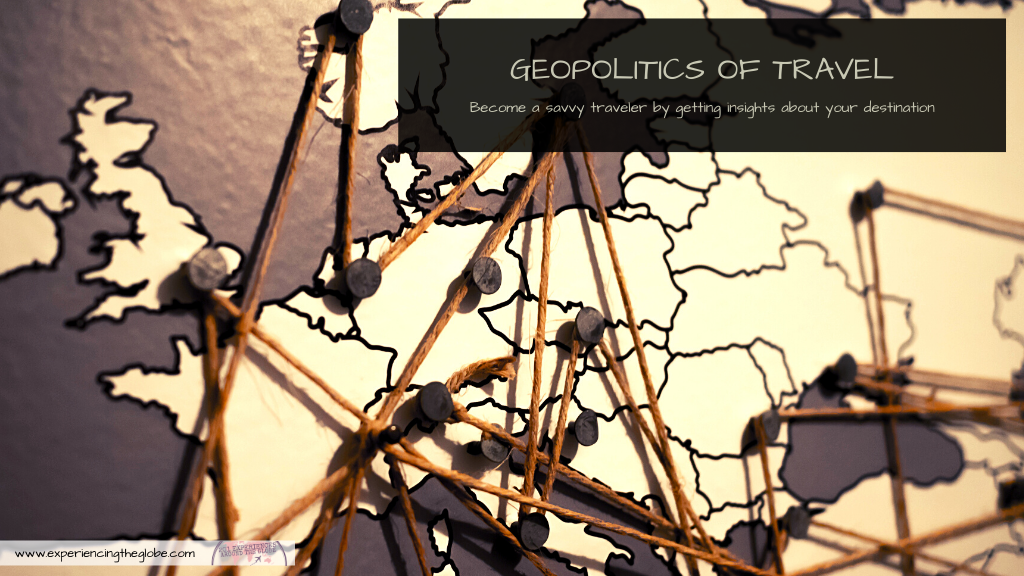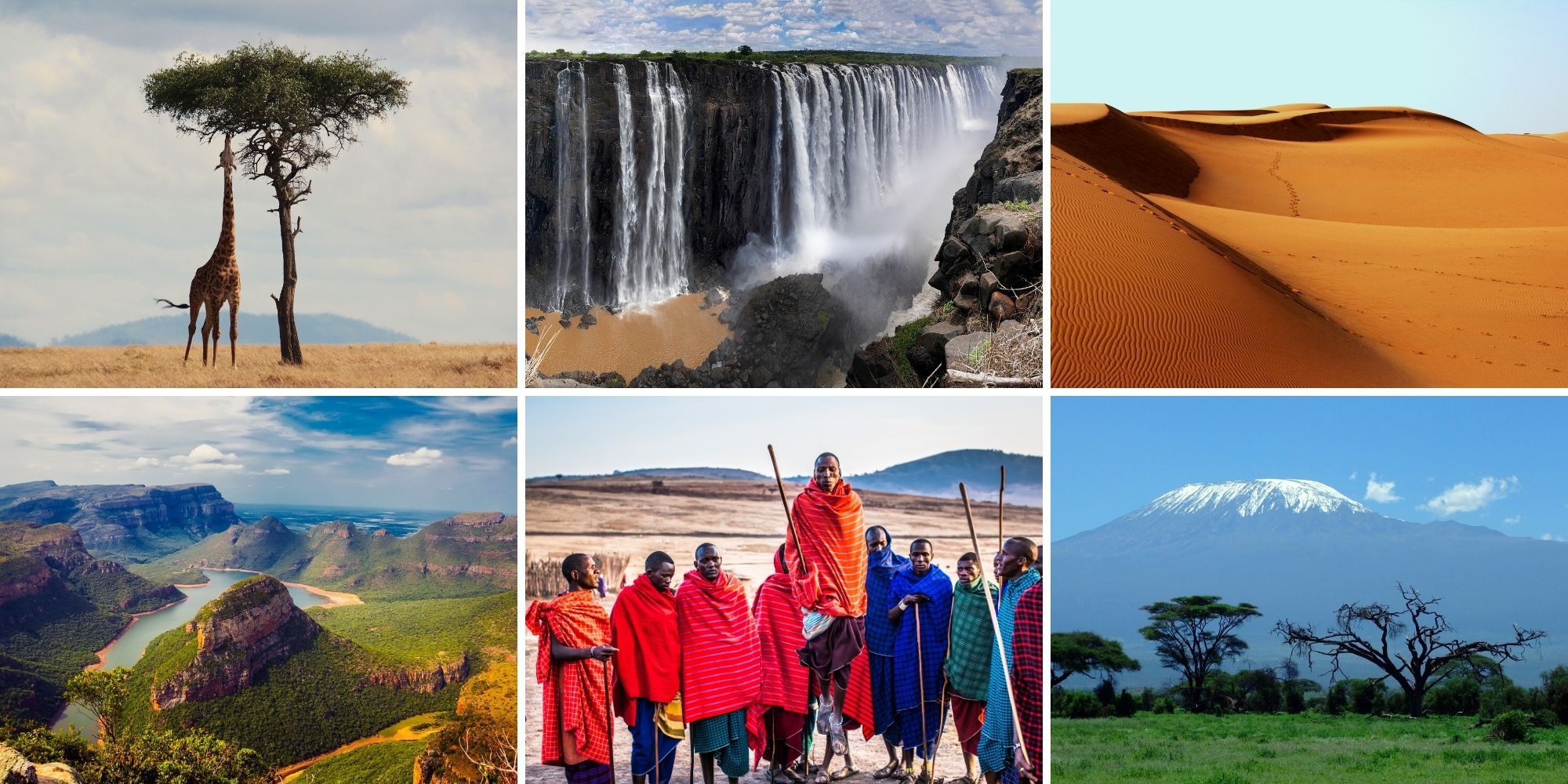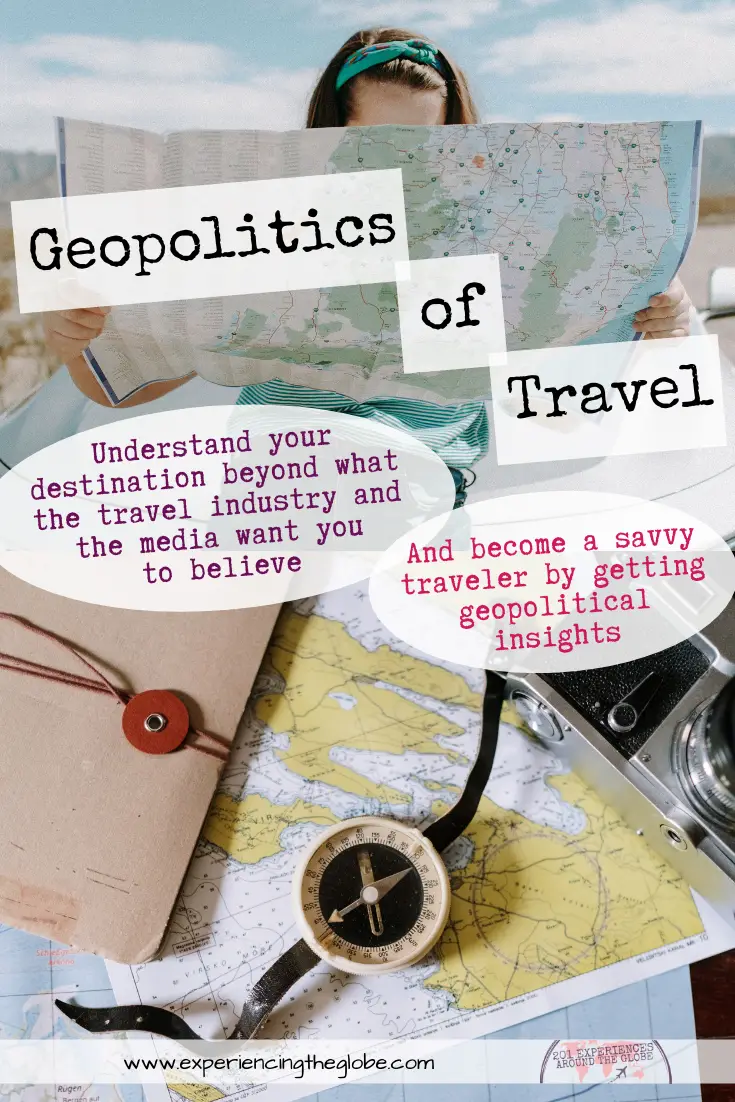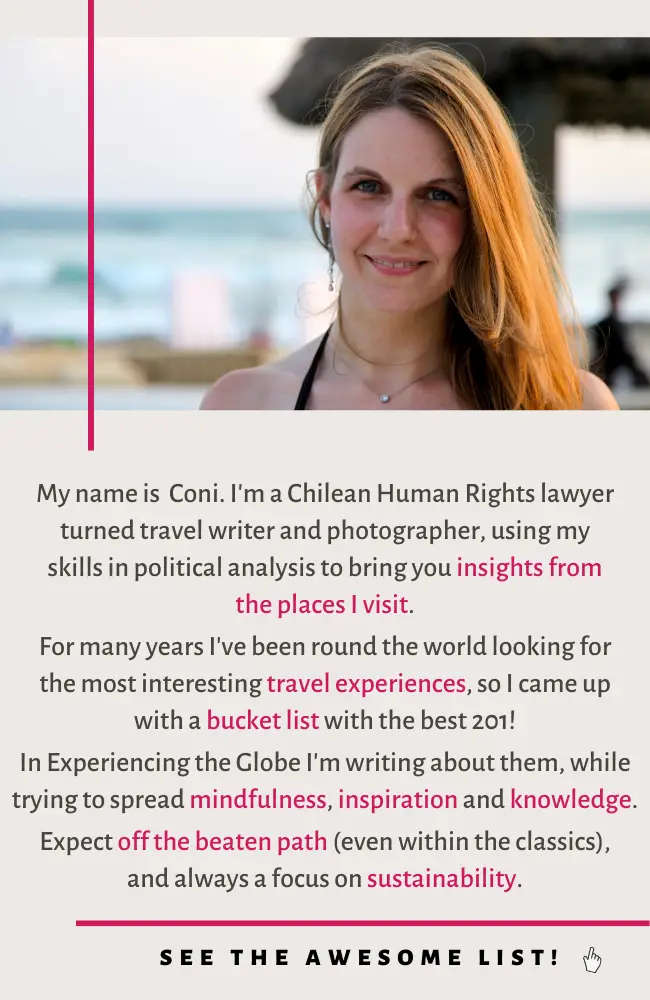

Have you ever wondered why Europe is in the center of the world in most maps, or why we count time from Greenwich in London? Have you noticed that many borders in Africa and the Middle East are straight lines, or, since we’re there, have you questioned why is it called ‘Middle East’? Do you know what’s a micro nation or why do they even exist? Have you heard of an exclave? Do you know why some islands are divided into different countries? Or how come a country can own a place on the other side of the world? Understanding the geopolitics of travel will make you a savvy traveler, and it’ll give you tools to have better insights on your destination, allowing you to dig deeper into the culture of the place, and to understand it beyond what the travel industry and the media want you to believe, so let’s start talking about it!
Maps have always fascinated me. Going around the globe with the tip of my finger was one of my favorite pastimes as a kid. And I still do it as an adult, looking for unique features and peculiar borders. Through my whole life I’ve been finding myself daydreaming about going ‘everywhere’ to witness how things look and work in different parts of the world. That’s how I started struggling with a million questions –and why I got a degree in International Relations.
Over the years I’ve gotten the answers to several of those questions, both from an academic perspective and from an empirical one, visiting the places that filled my days with queries.
So let’s put the pieces of the puzzle together and answer some of the questions you’ve been wondering yourself –and some you didn’t know you wanted answered, but now you feel like you need to read about.
“Geopolitics is a way of looking at the world: one that considers the links between political power, geography, and cultural diversity”
– Geopolitics, a very short introduction, by Klaus Dodds
Do we even agree on the basics?
One big surprise as a Latin American in Europe was to see that we count continents differently. I was told I’m from South America, while I fiercely argued that I’m from America, because it’s only one continent.
Is it only America or there’s two continents, one in the north and one the south? Is the body of water between Saudi Arabia and Iran called the Persian Gulf or the Arabic Gulf? What about the one between Japan and China, is it the East Sea or the Sea of Japan? When we say ‘China’, do we mean the Democratic Republic or the People’s Republic?
Let’s dig a bit deeper. Whether it’s five, seven or more continents, or if we call a place with one name or another doesn’t change the very basic fact that the land exists (and we can visit it!). Here’s when perception comes into place. For some of these questions there’s no unequivocal answer, because it’s all a social construct. I know I’m starting to sound technical, but stay with me.
Borders are not a work of nature, but something humans made up (and, in my opinion, one of the most hurtful things mankind ever created). They are an imaginary line in a map to make us forget that we are all same. This means that how we call things, or where we place them, enforces an idea over that particular land.
The Caucasus region is right in the area where we divide Europe and Asia. But being in one or the other makes a huge difference, because of what we, as travelers, associate with each continent. Central Asia and the Middle East are often related to ‘danger’ and ‘mystery’, while Europe is seen as ‘safe’ and a ‘must-see’. So, whether Armenia is said to be in one continent or the other is of vital importance –even though the trip will take you to the same place, regardless of what continent you theoretically put it on.
On the other hand, if you look at a map, is Greenland the same size of Africa? Probably you’ll see it that way. But the fact is that Africa is 15 times bigger than Greenland. Maps made up a reality that’s not there, especially when it comes to Europe. To showcase the importance of the Old Continent, maps put it in the middle, distorting everything around it. This affects the way we grasp distances, and it can make a big difference when planning a trip. Are you agreeing now on how important it is to know a bit about geopolitics?

The importance of geopolitics for travelers
In the simplest terms, geopolitics is how the world is represented, known, mapped and written, and for travelers is relevant to get how the ‘geo’ is ‘graphed’ into tourism.
Most will try to disassociate politics from traveling, but let me tell you, that’s a mistake. When talking about this I always hear “why learning about geopolitics when I simply want to travel?”, and here’s why:
- You’ll be able to plan your trip better. For example, sometimes when you have a passport stamp from one country you aren’t allowed to enter another, or some borders between countries are closed, or are particularly dangerous, so having a geopolitical understanding will allow you to organize your itinerary without running into hiccups on the road.
- Understanding the places you visit will allow you to dig deeper into the culture, and get better insights, which will translate into a more fulfilling trip.
- You’ll be much better prepared to have conversations with locals, to get an accurate perspective of what you’ve only heard from the media.
Looking beyond the picture painted by the travel industry…
The tourism industry is based on geopolitical imaginaries, social constructions of a place through descriptions that create a picture of a destination when selling it. When you hear a place is ‘safe’, ‘hectic’ or ‘mundane’, you immediately make up your mind about what to expect from your trip, and even whether you’ll be going or not to a particular destination. I’ve personally heard people deciding to skip India because it’s ‘dirty’ and Uganda because it’s ‘dangerous’, or stating that they want to visit the United Arab Emirates because they’re ‘luxurious’ and Morocco because it’s ‘exotic’ (this last one was actually me). As if one adjective could define a whole country.
Government officials, especially through tourism boards, will shape the discourse about the reality of the country, giving travelers little room for critical thinking –which, incidentally, is not often sought after while traveling. The tourism industry tends to stir away from political analysis, striving into an apolitical discourse to attract more guests, assuming they will prefer a destination only for its landscape, regardless of its soul.
When businesses turn a blind eye into the overall instability and unrest of places like Honduras and assure you that a visit to Roatán is ‘perfectly safe’, or when they keep building water villas in the Maldives and advertise them as ‘eco-friendly’ without considering the damage in the reefs or the fact that the islands are going to disappear under water in a few years due to climate change, they show how they only care about the travelers’ dollars, completely disregarding the well-being of the environment and the communities in the destinations. Don’t even let me get started about Africa. The marketing on ‘luxury’ safaris and ‘magical’ deserts –highlighting cliched colonial concepts– makes it look like it’s only one country, instead of the 54 extremely diverse ones that comprise the continent.

…And beyond the shortsighted media
Media influences the perception we have of a place, much more than we realize. From the description of events in biased outlets to the portrayal of destinations in television and movies, media not only popularizes or destroys destinations, it makes up your mind about them.
Think about Indonesia. People relate it with ‘spirituality’ because of the way Bali has been portrayed in films, even though the country is huge and that particular island is completely different from the rest. Iran, on the other hand, is often related with ‘terrorism’ because of what mass media unceasingly repeats, even though in the last decades there has been a lot more terror attacks in Europe than in the Asian country.
At the beginning of the millennium DiCaprio’s The Beach put Thailand in the map, while nowadays instagrammable destinations are at the top of people’s bucket lists. Take Iceland, Banff, Hallstatt or Chefchaouen as examples –a few years ago most didn’t even know about them.
Here’s where geopolitical knowledge will make a difference. Getting insights about a destination will allow you to look past what others want you to think. As much as Game of Thrones’ magnificent landscapes might influence you to visit Dubrovnik, you’ll be able to see beyond King’s Landing, and understand the vast history and culture of Croatia.
Geopolitics and the future of travel
It’s not only that geopolitics influence your travels, but traveling is shaping geopolitics as well. There’s an increasing need for stability, since tourism often is a huge part of the countries’ economy. There’s a growing concern about climate change, ranging from the effects of the carbon footprint of traveling (especially in places that suffer from extreme pollution and from overtourism) to the possibility of whole island nations disappearing (like Kiribati or Tuvalu). There’s a need to rethink our cities and their infrastructure to accommodate the visitors, which translates to better accesses and sewage systems for the extra people, as well as pondering the effects that businesses like Airbnb are having on the local communities and their cost of living.

We can achieve an equilibrium, in which knowledge of geopolitics improves our travel experiences, while we can influence positive change in the destination through focusing on sustainability. For sure there will be a positive feedback between travelers and destinations if we, as travelers, safeguard the environment, the wildlife and the local communities through a better understanding of the culture, traditions, customs, biodiversity, history, politics and geography of the place.
Traveling traditionally has been purposeful. But travel became an industry, and tourism a way to get money from citizen of richer countries. The industry and the media have been telling us where to go and what to do in order to maximize their earnings, disregarding the hurtful consequences tourism sometimes has. Now it’s on us, travelers, to own up to the effects of our decisions and get enough insights to go back to the essence of traveling.
→ Now that you’re interested in the geopolitics of travel, do you want answers to all the questions we started with? Let me know in the comments which ones to write about first!
Liked it? Want to read it later? Pin it!


Enjoyed what you read? A lovely way to show your appreciation is by buying me a cup of coffee 🙂
Your support will ensure I keep bringing you stories and insights from around the world! Thanks so much!



What a thought-provoking post. I’ve wondered how the pandemic will influence travellers’ post-Covid choices, and residents’ attitudes now that they’ve taken back their cities and countryside that were buckling under the weight of over tourism. I like to think that the pandemic has given us the space to think more about how we can become better informed and more responsible travellers. Thank you for this.
Thank you for your kind words, Anne! I think that if the pandemic leaves us one lesson it should be to travel more sustainably. I’m not sure if most will see it that way, but my hopes are that governments and the tourism industry in general will be able to push into that direction. We’re in front of a unique opportunity to sort of start from scratch, so we can set rules and change mindsets to stop overtourism, and take care of the environment, the wildlife, and the local communities 🙂
Amazingly interesting post! I haven’t thought of any of those questions, and, as you said, now I need to know. I’ll keep an eye on the blog for new posts.
I’m so glad you feel that way! I’ll be focusing on these questions through the year, so make sure you subscribe to get updates in your inbox 🙂
What a thoughtful (and thought-provoking) post. I totally agree with all your points. Destinations exist for more than tourists. Real people lead real lives, regardless of what you as a traveler expect (and what brochures depict).
I always make that point when talking about Venice. People go for the fairytale and forget that it’s a real city, with real people living there. A bit of knowledge on the places we visit can make a huge difference, both for the traveler and for the destination!
Such a well thought out post and a great reminder that seeing the world is a lot deeper than just pretty pictures on Instagram. Thanks for sharing your views and for giving my brain a workout on a lazy Sunday afternoon 🙂
Thanks for reading and for your lovely words, Emma!
This might be too broad and a bit non-specific, but I’ve been wondering about the lasting impact of various border closures during this pandemic. There are countries that closed their borders to nearly everyone, and then countries that only closed the borders to certain countries. How will those situations play out? I’m sorry the question isn’t better formed, but it seems like with the virus we have a whole extra set of geopolitical hurdles to work through (both mentally and logistically) to create a world where we really are all viewed as equal in humanity.
What an interesting question! I think we won’t have an answer any time soon, though. One of the main geopolitical effects of the pandemic is that it’s highlighting inequalities. Think of the access to testing and now to vaccines. The western world already drafted contracts with suppliers and is expecting to have high percentages of the population vaccinated by mid-2021. In Africa, on the other hand, there are countries that don’t even have an estimated number of infected people because there are no tests. Vaccines are not even in their dreams. So as much as I can advocate for seeing humans as the same, in practice that’s far away from being the norm. As for border closures, I guess everyone’s reaction was to close, but some just couldn’t afford it. It’s heartbreaking to see these differences, but it’s super important to be aware of them to contribute towards changing them.
I think its super important to understand the location that you choose to travel to especially in places where there’s over tourism and its impact on the local economy, environmental impact, and be mindful about your consumption choices such as where you stay, where you eat, what you buy in the location, and also your environmental footprint.
I couldn’t agree more, Alaine! Sometimes we don’t even know how much damage we cause for not being aware of the effect of our choices, so it warms my heart when I see other travelers being conscious about sustainability!
Very interesting article! The most fascinating part is the world map and how it portrays certain regions larger than to make them seem more powerful. The point on travel stamps is also important, and if you take my country, Cyprus on that is a great example, as you may not be allowed entry if you have a stamp on your passport of the so-called “Republic of Northern Cyprus” and some locals will even get offended if you say that you visited the northern part of the island for tourism.
Thanks, Elina! It’s really cool to see the actual size of places, and how tiny Europe is. As for Cyprus, that’s an excellent example! I haven’t been there yet, but I think is fascinating (that’s why it’s on my list) -I can’t wait to go!
Food for thought! A great reminder that all travelers should try to remain conscious of how their decisions impact the communities they visit. I would love to read more about the way international tourism companies are affecting the sustainability of local tourism.
Thanks, Kelli! I have that post already on the writing, so stay tuned! 🙂